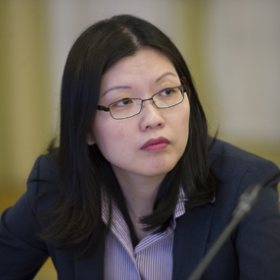
Advancing Cooperation Between the U.S. and China
From June 7 to 11, 2010, EWI led a delegation of senior American experts to Beijing for talks with Chinese officials, scholars and military representatives as part of its fourth U.S.-China High-Level Security Dialogue, co-organized with the China Institute of International Studies (CIIS).
Members of the U.S. delegation included EWI President and CEO John Edwin Mroz; retired General Eugene Habiger, former Commander in Chief of the U.S. Strategic Command; retired General Charles F. Wald, former Deputy Commander in Chief of the U.S. European Command; former Assistant U.S. Trade Representative Timothy Stratford; Joel Cowan, a member of the EWI Board of Directors; David Firestein, EWI's Director of Track 2 Diplomacy; Piin-Fen Kok, EWI's China Program Associate; and Karl Rauscher, EWI's Chief Technology Officer and Distinguished Fellow.
The delegation engaged in a day and a half of discussions with Chinese experts hosted by CIIS and met with Vice Foreign Minister Cui Tiankai, Vice Minister Liu Jieyi of the Chinese Communist Party’s International Department, and Vice Minister Sun Yafu of the State Council Taiwan Affairs Office. The group also visited the China Institute for International Strategic Studies, the China Arms Control and Disarmament Association, the China Institutes of Contemporary International Relations, Horizon Research Consultancy Group (a public opinion polling firm) and the China Social Entrepreneur Foundation.
The main purpose of the Dialogue was to explore concrete ways to increase strategic trust between the United States and China. Topics addressed included:
- Critical concerns in U.S.-China political, military and economic relations, including Taiwan, Tibet and barriers to the bilateral trade-and-investment relationship.
- Public diplomacy: Identifying and debunking the main myths about the U.S.-China relationship, clarifying strategic perceptions of each other, and addressing how each country can make itself better understood.
- The situation in the Middle East, including the Iran nuclear issue and opportunities for U.S.-China cooperation to promote socio-economic development in the region.
- Strategic stability in the 21st century: Balancing strategic offensive and defensive weapon systems.
- Potential U.S.-China cooperation on outer space.
The dialogue produced important new institutional partnerships for EWI in China and laid the groundwork for continued U.S.-China Track 2 activities.

